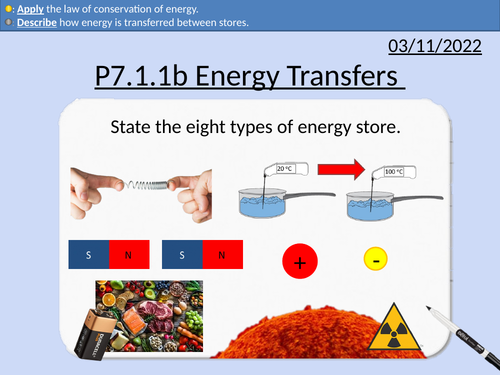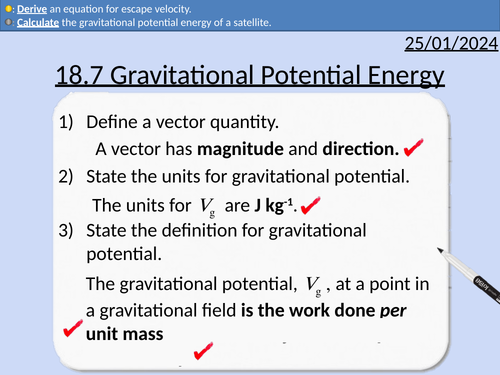497Uploads
168k+Views
71k+Downloads
Physics

OCR A level Physics: Exploring Centripetal Forces
OCR A level Physics: Centripetal Force and the Radian is a part of the Module 5: Newtonian world and astrophysics.
All presentations come with worked examples, solutions and homeworks with answers.
Bundle

OCR A level Physics: Circular Motion
OCR A level Physics: Thermal Physics apart of the Module 5: Newtonian World and Astrophysics.
All presentations come with worked examples, solutions and homeworks.
Bundle

GCSE OCR Physics P5.1 Wave Behaviour
Resources for P5.1 GCSE OCR Physics Gateway 9-1 Triple and Combined (Higher and Foundation) is covered in this material.
Each lesson includes student activities and full worked answers.
Includes:
Definition of a wave
Mechanical waves
Electromagnetic waves
Transverse waves
Longitudinal waves
Amplitude
Wavelength
Frequency
Time period
Calculating frequency and equation
Relationship between frequency and wavelength when speed is constant.
Calculating time period from frequency with equations
The speed equation
Measuring distance and time
Simple experiment for the speed of sound
Improving experiments
Echoes
Speed of sound experiment with microphones and oscilloscope.
Ray diagrams
Absorption, reflection and transmission
Sonar
Ultrasound
Rearranging equation
Refraction
Relationship between wave speed and wavelength
Structure of the ear.
Frequency range of human hearing.
Explanation of the limited frequency range of humans.
Explanation for hearing deteriorating with age.

GCSE Physics: Wave Velocity & Water Waves
This presentation covers OCR Gateway Physics 9-1 P5.1.2a Wave Velocity & Water Waves. Includes student activities and full worked answers.
Definition of mechanical waves
Water waves as a transverse waves
Converting from cm, mm, and km into m.
Definition and equation for frequency.
Wave speed equation
Rearranging equations
Ripple tank demonstration and explanation

GCSE Physics: The Speed of Sound
This presentation covers OCR Gateway Physics 9-1 P5.1.2a the speed of sound and wave velocity. Includes student activities and full worked answers.
The speed equation
Measuring distance and time
Simple experiment for the speed of sound
Improving experiments
Echoes
Speed of sound experiment with microphones and oscilloscope.

GCSE Physics: Electromagnetic Reflection
This presentation covers OCR Gateway Physics 9-1 P5.3.1a Electromagnetic Reflection. Includes student activities and full worked answers.
Law of reflection
Labeling and measuring angles of incidence and reflection
Practical activity instructions - fully animated.
Reflection, absorption, and refraction is affected by wavelength of electromagnetic wave.
Bundle

GCSE OCR Physics P5.2 Electromagnetic Spectrum
Resources for P5.2 GCSE OCR Physics Gateway 9-1 Triple and Combined (Higher and Foundation) is covered in this material.
Each lesson includes student activities and full worked answers.
Order of the electromagnetic spectrum
Wavelength and frequency relationship
Application of wave speed equation
Rearranging equation
Producing and detecting radio waves
Recall that light is an electromagnetic wave
Give examples of some practical uses of electromagnetic waves in the radio, micro-wave, infra-red, visible, ultraviolet, X-ray and gamma-ray regions
Describe how ultra-violet waves, X-rays and gamma rays can have hazardous effects, notably on human bodily tissues.
Explain that electromagnetic waves transfer energy from source to absorber to include examples from a range of electromagnetic waves
Precautions for ultra-violet waves, X-rays and gamma rays
Careers: Medical Physicist
X-rays
CT scans
Gamma imaging
Thermogram
Magnetic Resonance Imaging
Precautions for using ionising radiation

GCSE Physics: Electromagnetic Refraction
This presentation covers OCR Gateway Physics 9-1 P5.3.2a Electromagnetic Reflection.
Includes student activities and full worked answers.
Refraction the change of velocity - speed and direction
Magnitude of refraction depending on wavelength
Magnitude of refraction depending on optical density
Refraction practical activity instructions
Wave speed, wavelength, and frequency relationship in refraction
Bundle

GCSE OCR Physics P5.3 Wave Interactions
Resources for P5.2 GCSE OCR Physics Gateway 9-1 Triple and Combined (Higher and Foundation) is covered in this material.
Each lesson includes student activities and full worked answers.
Law of reflection
Labeling and measuring angles of incidence and reflection
Practical activity instructions - fully animated.
Reflection, absorption, and refraction is affected by wavelength of electromagnetic wave.
Refraction the change of velocity - speed and direction
Magnitude of refraction depending on wavelength
Magnitude of refraction depending on optical density
Refraction practical activity instructions
Wave speed, wavelength, and frequency relationship in refraction
Convex and Concaves lenses
Eyes and corrective lenses
Refraction and wavelength
Focal points for lenses
Determining the type of images produced through a lens
Names of colours for the visible spectrum
Coloured filters
Coloured objects acting as a coloured filters
White light and refracting prism
Refraction and wavelength
Specular reflection
Diffuse scattering
Scattering - Why the sky is blue and milk is white.
Bundle

GCSE OCR Physics P5 Waves
Resources for P5 GCSE OCR Physics Gateway 9-1 Triple and Combined (Higher and Foundation) is covered in this material.
Each lesson includes student activities and full worked answers.
Definition of a wave
Mechanical waves
Electromagnetic waves
Transverse waves
Longitudinal waves
Amplitude
Wavelength
Frequency
Time period
Calculating frequency and equation
Relationship between frequency and wavelength when speed is constant.
Calculating time period from frequency with equations
The speed equation
Measuring distance and time
Simple experiment for the speed of sound
Improving experiments
Echoes
Speed of sound experiment with microphones and oscilloscope.
Ray diagrams
Absorption, reflection and transmission
Sonar
Ultrasound
Rearranging equation
Refraction
Relationship between wave speed and wavelength
Structure of the ear.
Frequency range of human hearing.
Explanation of the limited frequency range of humans.
Explanation for hearing deteriorating with age.
Order of the electromagnetic spectrum
Wavelength and frequency relationship
Application of wave speed equation
Rearranging equation
Producing and detecting radio waves
Recall that light is an electromagnetic wave
Give examples of some practical uses of electromagnetic waves in the radio, micro-wave, infra-red, visible, ultraviolet, X-ray and gamma-ray regions
Describe how ultra-violet waves, X-rays and gamma rays can have hazardous effects, notably on human bodily tissues.
Explain that electromagnetic waves transfer energy from source to absorber to include examples from a range of electromagnetic waves
Precautions for ultra-violet waves, X-rays and gamma rays
Careers: Medical Physicist
X-rays
CT scans
Gamma imaging
Thermogram
Magnetic Resonance Imaging
Precautions for using ionising radiation
Law of reflection
Labeling and measuring angles of incidence and reflection
Practical activity instructions - fully animated.
Reflection, absorption, and refraction is affected by wavelength of electromagnetic wave.
Refraction the change of velocity - speed and direction
Magnitude of refraction depending on wavelength
Magnitude of refraction depending on optical density
Refraction practical activity instructions
Wave speed, wavelength, and frequency relationship in refraction
Convex and Concaves lenses
Eyes and corrective lenses
Refraction and wavelength
Focal points for lenses
Determining the type of images produced through a lens
Names of colours for the visible spectrum
Coloured filters
Coloured objects acting as a coloured filters
White light and refracting prism
Refraction and wavelength
Specular reflection
Diffuse scattering
Scattering - Why the sky is blue and milk is white.

GCSE Physics: Energy transfers and Conservation of energy
This presentation covers OCR Gateway Physics 9-1 P7.1.1b Energy stores transfers and Conservation of energy.
This PowerPoint covers while including student activities and worked answers:
The law of conservation of energy.
The energy transfer pathways:
Mechanically – with forces
Electrically – with current
Heating by particles
Heating by radiation
Describing stores and transfers for:
Object projected upwards or up a slope,
A moving object hitting an obstacle,
An object being accelerated by a constant force,
A vehicle slowing down,
Bringing water to a boil in an electric kettle

OCR A Level Physics: Gravitational Potential Energy
OCR A level Physics: 18.7 Gravitational Potential Energy
Module 5 Newtonian World and Astrophysics
This PowerPoint is a whole lesson included with student activities, animated answers, homework questions with answers provided.
This lesson covers:
Radial and uniformed field
Definition of gravitational potential energy
Deriving escape velocity
Force-Distance graphs for gravitational fields

OCR AS Physics: Thermistor
OCR AS Physics A: Thermistor is a part of the Module 4: Electrons, Waves, and Photons. PowerPoint with worked examples and homework.
Thermistor uses
Thermistors with negative temperature coefficients
Plotting I-V curves for thermistors
Creating an experiment to test thermistors.

OCR AS Physics: Diodes
OCR AS Physics A: Diodes is a part of the Module 4: Electrons, Waves, and Photons. PowerPoint with worked examples and homework.
Polarity of diodes
Conventional current and diodes
Plotting I-V curves for diodes
Describing I-V curves for diodes

OCR AS Physics: Electrical Energy & Power
OCR AS Physics: Electrical Energy & Power is a part of the Module 4: Electrons, Waves, and Photons. PowerPoint with worked examples and homework.
Derive three equations for electrical power
Applying electrical power equations
Create a circuit diagram to calculate power
Base units for V A and W.

OCR AS Physics: Combining Resistors
OCR AS Physics A: Combining Resistors is a part of the Module 4: Electrons, Waves, and Photons. PowerPoint with worked examples and homework.
Rules for adding resistors in series and parallel
Applying adding resistors in series and parallel

OCR AS Physics: Paying for Electricity
OCR AS Physics: Paying for Electricity is a part of the Module 4: Electrons, Waves, and Photons. PowerPoint with worked examples and homework.
Converting time to hours
Using different units for electrical energy
Converting from J to kW hr
Calculating the cost of using different electrical appliances.

OCR AS Physics: Internal Resistance
OCR AS Physics: Internal Resistance is a part of the Module 4: Electrons, Waves, and Photons. PowerPoint with worked examples and homework.
Find lost volts and terminal potential difference from a source of emf
Calculate internal resistance of a cell
Calculate internal resistance of a cell with a graph
Calculate EMF of a source

OCR AS Physics: Potential Dividers
OCR AS Physics A: Potential Divider is a part of the Module 4: Electrons, Waves, and Photons. PowerPoint with worked examples and homework.
Application of the ratio of resistances
Application of the potential divider circuit
Deriving the potential divider equation
Rearranging the potential divider equation

OCR AS Physics: Wave Properties
OCR AS Physics: Wave Properties is a part of the Module 4: Electrons, Waves, and Photons. PowerPoint with worked examples and homework.




















